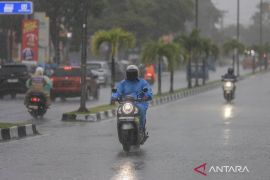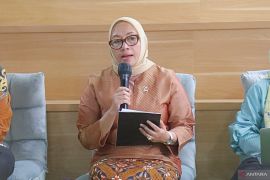Jakarta (Antara Bali) - President Joko Widodo (Jokowi) expressed willingness to consider any inputs from different parties regarding the ongoing Jakarta-Bandung high-speed railway project.
Various opinions, particularly concerning the projects licensing problems and environmental impact assessment (Amdal), surfaced following the groundbreaking event.
The head of state officiated the groundbreaking of the project in Cikalong Wetan, Bandung District, West Java Province, on January 21, aimed at improving public mass transportation and the publics welfare.
"After the groundbreaking ceremony for the implementation of the high-speed train project, there are inputs, which we have read in public, including from members of the Parliament and also from community groups. Of course, the president listens to them," Johan Budi S.P., presidential special staff in charge of communication, stated in Jakarta, on January 27.
The project was decided after a lengthy process and not instantly, he stated.
"What I have heard is that the project has been under discussion since a year, including its Amdal, which has been evaluated for the past six months," he noted.
The construction of the high-speed railway is estimated to cost US$5.5 billion, with 75 percent of the financing coming from the China Development Bank (CDB) and the rest from Indonesias state enterprises.
The railway track is 142.3 kilometers in length, with four stations and a depot facility in Tegalluar, Bandung.
The four stations will be located in Halim, Karawang, Walini, and Tegalluar.
The construction work on the PT Kereta Cepat Indonesia China (KCIC-Indonesia-China High-Speed Railway) project begins in early 2016, is expected to be completed in 2018.
The government is optimistic that the sophisticated rail line connecting the countrys capital city and the capital of West Java, will offer myriad benefits in terms of local development and public transportation.
The presence of the high-speed rail would boost economic development in the surrounding areas, President Jokowi pointed out.
"Once the work on the project is completed, then the construction of the Light Rail Transit project in Bandung will also finish," he remarked.
Jokowi explained that no state budget funds would be utilized in the project as it would be financed entirely by China and Indonesian state-owned companies.
"Based on the scheme, the government could concentrate on using the budget funds for infrastructure development projects in Sumatra, Papua, and other regions," he affirmed.
He expressed belief that the high-speed railway project would encourage other regions to develop their public transport infrastructure.
Hanggoro Budi Wirjawan, the director of PT Kereta Cepat Indonesia China, which is implementing the project, said that most of the workers involved in the project would be Indonesians, with their Chinese counterparts working as experts.
Once the project later becomes operational, hopefully in early 219, it will absorb 28 thousand workers, he added.
State Enterprises Minister Rini M. Soemarno has said everyone should support the construction of high-speed railway because it will bring a lot of benefits to the Indonesian nation.
"We will become the first country in ASEAN to have a high-speed train. Later, (we will handle the issue of) transfer of technology. This is a potential (project) that has to be developed together," Minister Rini said in a discussion organized by the Association of the Ten November Institute of Technologys Alumni, in Jakarta recently.
The project is also expected to help develop an unproductive area of state-owned plantation company, PTPN VIII in Walini, West Java.
She said she was aware of the criticism about why the government did not select Sulawesi or Kalimantan for such a project.
The minister said she agreed that those regions must be developed. The Jakarta-Bandung high-speed railway project will not use funds from the State Budget, because the budget is prioritized for infrastructure development outside the Java Island.
However, this does not mean that development in Java should be stopped.
Indonesia should be more competitive and is often perceived to have lagged behind in constructing public transportation infrastructure.
A similar appealed was also voiced by the General Chairman of the National Democrat Party (NasDem), Surya Paloh, who called on all stakeholders in the country to support the construction of Jakarta-Bandung high-speed railway project.
"When the government says it should be carried out, then it should work. So, all components must support the high-speed railway project," Paloh said recently.
The Jokowi-Kalla administration is preparing better infrastructure, according to him.
It should become a matter of national pride as the country is entering an era of modernization with the development of a high-speed railway.
The mass media tycoon said the government should consistently follow the path of planned infrastructure development.
He made a comparison of toll road construction projects between China and Indonesia.
In 1977, Indonesia had built a 60-km long toll road, while China had none.
But now, Indonesia has less than one thousand kilometer of toll road length, while Chinas toll roads have reached a total of 280,700 km, according to him.
The Indonesian government has to optimize its existing resources to develop infrastructure to enable it to become a locomotive for the world economy, he said.
In the meantime, during a hearing of the Commission V of the House of Representatives (DPR) recently, Transportation Minister Ignasius Jonan said the project executor, PT Indonesian-Chinese High-Speed Railway (KCIC) company has not obtained concession and construction permits.
The concession permit must be completed soon to prevent the government from bearing any burden if the construction project fails in the middle of implementation, he remarked.
The minister said he had returned the KCICs documents for obtaining a construction permit because they were in the Chinese language.
The projects environmental impact assessment (Amdal) reportedly did not include data on the disaster risks in the project area and whether the project would affect the water supply in the surrounding areas.
However, Minister Jonan had issued the trace permit for the project, spokesman of the transportation ministry J.A. Barata noted in a statement recently.
The trace permit is stipulated in Transportation Ministry Decree No. KP 25 of 2016 on the track route of the High-Speed Railway Line connecting Jakarta and Bandung through the Halim-Tegalluar Crossing.
"The trace permit was requested by PT KCIC. The transportation minister issued the trace permit after all requirements were met, including the recommendations from the provincial, municipal, and district administrations whose areas are covered by the Jakarta-Bandung High-Speed Railway line," Barata remarked.
The plan to develop a high-speed railway came to light when President Jokowi visited China.
After a joint study with China, the project was considered viable without the governments financing or guarantee. (WDY)




